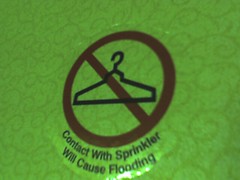Oddest thing. I pulled the PowerBook out the laptop bag and a handful of keys stopped responding.
I’ve opened up the Keyboard Viewer to confirm. Here’s the list thus far:
return & enter (came back after restart)- Tilde
- Caps Lock
- F12 (initiates my Dashboard)
- Disc eject
- Left square bracket
- Arrow up
- Arrow right
I plugged in the USB keyboard from the eMac and that brought everything back. Weird.
Update 14 January 2006
Problem came back today – lost ‘Q’ through ‘P’. Seems to happen when waking from sleep. This time plugging in the external keyboard didn’t fix it, nor did restarting. Waiting did. Maybe 10 minutes and all the keys came back.
Update 15 January 2006
‘Q’ through ‘P’ is gone again. I’m typing this from the keyboard viewer. Annoying. Apple says I need to replace the keyboard. Blah.
Ok. After a couple hours sleeping. The top row is back, but and all those other keys are gone. Oddly, this is less annoying. Let’s see what happens on restart.
Everything was going great until I plugged the PowerBook in after running down the battery for 2 hours. Then, I lost the keys again. Not all at once. First delete and the arrows, then a couple minutes later – the top row.
Top row is back. Space, delete, and arrows are still gone.
Update 16 January 2006
Stopped by the Apple Store – Roseville this afternoon, got the keyboard diagnosis confirmed and put one on order. Thankfully, they can handle the repair locally.
Update 21 January 2006
Took in the PowerBook for the repair this afternoon. I got a call as soon as I left the Apple Store saying the keyboard’s connecting cable was loose. They firmly plugged it in and everything’s back to normal. No repair necessary. Definitely a downside of locking the PowerBook down so tightly – not even the Geniuses could correctly diagnose the problem.



